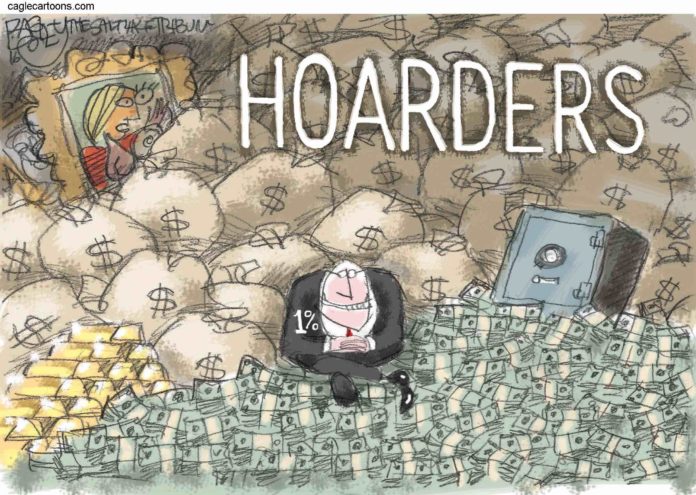BY DAVID PERRYMAN
 In a hollow, deep in the heart of the Ouachita Mountains on an October Sunday afternoon 56 years ago, more than 25,000 Oklahomans patiently gathered at a remote junction for the formal opening of a road. The striking size of the crowd was because it was not just anyone who would be cutting the ribbon.
In a hollow, deep in the heart of the Ouachita Mountains on an October Sunday afternoon 56 years ago, more than 25,000 Oklahomans patiently gathered at a remote junction for the formal opening of a road. The striking size of the crowd was because it was not just anyone who would be cutting the ribbon.
The president of the United States was paying a visit. While the official purpose of the ceremony was the dedication of a north-south highway across mountain ranges that predominately run east and west, the family of U.S. Sen. Robert S. Kerr maintains that the real purpose of President John F. Kennedy’s 1961 visit was to return a favor to Kerr who had stood solidly with Kennedy and delivered a bloc of votes on a Medicare bill that was very important to JFK.
Regardless of the backstage story, without the strong friendship between Kennedy and Kerr, Oklahoma would not have been front and center on that fall day as the crowd watched the tandem rotor helicopter come over the mountain peak at Big Cedar. When President Kennedy climbed down from helicopter and walked next to the crowd, he saw hope in the face of Oklahomans who were only a couple of decades removed from the most difficult economic times that they and their families had ever faced.
But things were better. President Franklin Roosevelt’s New Deal and the infrastructure improvements that had followed had provided jobs even in rural Oklahoma. President Kennedy recognized this in his speech.
He began, “I am proud to come to Oklahoma. During the campaign last year I met many citizens of this state, but not in this state. I met them in Alaska, where many Oklahomans had gone in the ‘30s to build a new life. I met them in the valleys of California, where many citizens of this state had gone in the ‘30s to build a better life.” President Kennedy lamented those hard times that had driven Oklahomans to other states in search of ways to support their families.
The president also recognized that because of the leadership of men like Robert S. Kerr, Carl Albert, Mike Monroney and Tom Steed, Oklahoma’s future had changed. Because of infrastructure improvements that had been promoted and championed by these men and the priority that they placed on allowing federal dollars to be invested in our state, Oklahoma’s future would allow our best and brightest as well as our children and grandchildren to provide for their families here and not migrate to other states.
He said, “Now the citizens of Oklahoma stay in Oklahoma. Now they recognize the opportunities that are to be found in this state – and Oklahomans, instead of leaving, are coming home.” President Kennedy credited the reversal of the migration to the commitment and determination of Oklahomans to build Oklahoma for them and their posterity. The message was clear.
The reverse of that message is just as clear … to send Oklahomans to other states, we only need to ignore infrastructure needs, and starve education and health care.
When visionary men and women are removed from the equation and Oklahoma’s policy decisions are based solely on the benefit that laws will provide to corporate interests, it is just a matter of time that Oklahomans will leave Oklahoma for the exact same reason that Oklahomans migrated to California and Alaska in the 1930’s.
The outward migration of Oklahoma educators is simply a symptom of a much larger problem. A state government that no longer meets the needs of its people is no longer a government of the people, and Oklahoma has reached that point.
To make up for quality teachers that are leaving the state or leaving the profession or both, the State Board of Education recently announced that in July 2017, more than 220 emergency certifications were issued as compared to fewer than 80 in the same month last year. For fiscal year 2017, there were a record number 1,200 emergency certifications issued reflecting an increase of about 9% over the previous year. To put those numbers in perspective, just five years ago Oklahoma issued just 30 emergency certifications all year long.
Like education, rural hospitals, ambulance services and clinics are foundering because Oklahoma’s policy decisions leave hundreds of millions of dollars of federal health care dollars on the table. Those dollars are the life-blood of health care and are vital to the medical and medical related industries in our state.
It is imperative that we look toward the future. It is imperative that we understand the value of investing in ourselves, our children and our grandchildren. As a state, our collective tomorrows depend on it.
– David Perryman, a Chickasha Democrat, represents District 56 in the Oklahoma House








